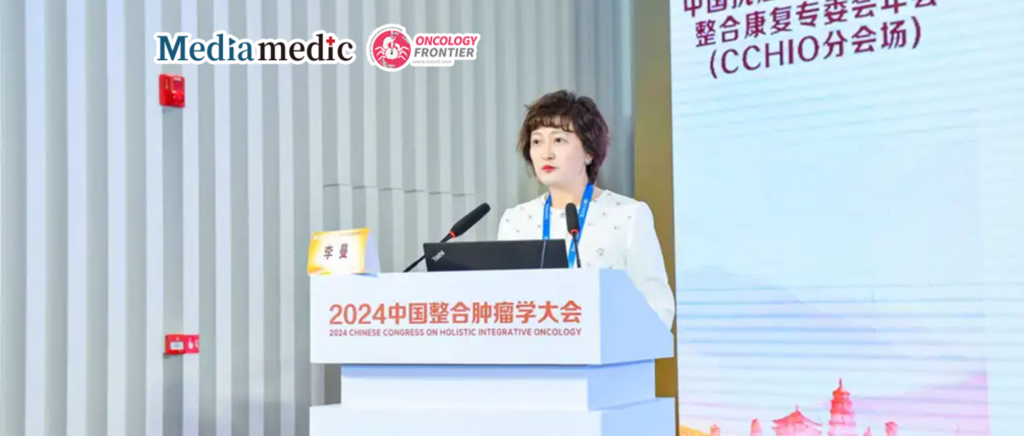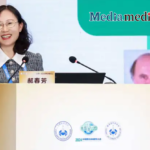
Editor's Note: Breast cancer remains a major threat to women’s health, with continuous advancements in treatment strategies being a focal point for the medical community. In China, as the concept of precision medicine gains momentum, systematic breast cancer treatment is gradually moving towards more personalized and precise approaches. At the 2024 Chinese Congress of Holistic Integrative Oncology (CCHIO) during the Breast Oncology Integrative Rehabilitation session, Dr. Man Li from The Second Hospital of Dalian Medical University delivered a presentation titled “Current Status and Advances in Systematic Breast Cancer Treatment in China”, offering an overview of treatment strategies for different subtypes of breast cancer. In an interview with Oncology Frontier, Professor Li discussed the challenges facing systematic treatment and the future directions of breast cancer therapy, emphasizing the transformative role of precision medicine in shaping treatment paradigms.1. Oncology Frontier: As a clinician deeply involved in breast cancer treatment and research, could you provide an overview of the current status and significant advancements in HR+ breast cancer treatment?
Dr. Man Li: Systematic treatment plays a vital role in managing breast cancer. For HR+ breast cancer patients, the importance of first-line therapy has become increasingly evident. The combination of CDK4/6 inhibitors and endocrine therapy has emerged as the gold standard for first-line treatment in HR+/HER2- advanced metastatic breast cancer. This approach effectively delays the need for chemotherapy, a conclusion supported by numerous large-scale randomized controlled clinical trials.
With the widespread use of CDK4/6 inhibitors, selecting the next treatment option after disease progression presents new challenges. Today, we emphasize precision in targeting treatment pathways. For patients suitable for endocrine therapy, PIK3CA mutation testing is the first step, and those with mutations benefit from PI3K inhibitors. Similarly, patients with alterations in the PAM pathway have shown promising responses to AKT inhibitors. Furthermore, ESR1 mutations are critical targets in the post-CDK4/6 inhibitor era. For patients with ESR1 mutations who derive prolonged benefit (≥1 year) from first-line CDK4/6 inhibitors, SERD drugs can provide effective treatment upon disease progression.
In the post-CDK4/6 inhibitor era, prioritizing precise target selection is essential. For patients without actionable targets, cross-line use of CDK4/6 inhibitors remains an effective option. Studies like postMONARCH and MAINTAIN have demonstrated the benefits of using abemaciclib or ribociclib for cross-line treatment, particularly for patients previously responsive to endocrine therapy. Additionally, mTOR inhibitors can be considered. For patients experiencing further progression, the DB-06 clinical trial suggests that T-DXd is the preferred option for HER2-low or ultra-low expressing patients, while chemotherapy remains an important choice for HER2-negative patients. Sacituzumab govitecan also offers survival benefits for patients with endocrine resistance and multiple lines of chemotherapy.
2. Oncology Frontier: Your presentation at this conference focused on “Current Status and Advances in Systematic Breast Cancer Treatment in China.” What are the main challenges facing systematic treatment, and what solutions or research directions do you see for the future?
Dr. Man Li: The primary challenge in systematic breast cancer treatment lies in achieving precision treatment. Moving forward, we will focus on precisely selecting therapeutic targets in the post-CDK4/6 inhibitor era, particularly for patients with alterations in the PIK3CA, PTEN, AKT pathways, and ESR1 mutations. Selecting targeted inhibitors and therapeutic drugs for these patients will be key.
Precision medicine is equally crucial for other molecular subtypes of breast cancer. In triple-negative breast cancer, first-line treatment for advanced cases should begin with PD-L1 expression testing, followed by toripalimab combined with chemotherapy based on results from the TORCHLIGHT study. Patients with BRCA mutations can achieve longer survival with PARP inhibitors. For HER2-positive breast cancer patients, targeted anti-HER2 therapies increasingly emphasize the importance of precise targeting. Therefore, early diagnosis with precise target identification and the application of corresponding inhibitors will be vital in achieving long-term survival for patients.
3. Oncology Frontier: With advancements in medical technology and the development of new drugs, could you share your hospital’s innovative practices in systematic breast cancer treatment, particularly in multidisciplinary collaboration, personalized treatment plans, and improving patient quality of life?
Dr. Man Li: Although our breast cancer department was established relatively late, we have consistently adhered to a standardized development approach. Following the CBCS and CSCO breast cancer guidelines, we emphasize standardized treatment.
In early-stage breast cancer, we strive to minimize complications and improve cosmetic outcomes in breast-conserving and reconstructive surgeries. For adjuvant therapies, we escalate or de-escalate treatment based on recurrence risk, helping early-stage patients move toward a cure.
For advanced-stage patients, we focus on stratified analysis and standardized treatment plans. In later-line therapies, we carefully select targets to provide precise treatment for patients eligible for targeted therapies. We have a dedicated MDT team that includes pathologists, radiologists, and radiation oncologists, holding weekly meetings to significantly enhance our younger doctors’ understanding and treatment capabilities in breast cancer.
Looking ahead, we aim to foster more collaborations, exchange ideas with international experts, and establish platforms with domestic colleagues. Initiatives such as our “Half-Month Discussions” and “Premium Cloud Classrooms” invite top MDT teams across China to share strategies in breast cancer treatment. Additionally, we place great importance on patient education to enhance adherence to treatment plans and improve quality of life. By partnering with media platforms, we help patients understand and manage adverse reactions to medications, reducing unnecessary detours and enabling real benefits.

Dr. Man Li Doctor of Medicine, Professor, Doctoral Supervisor Director of the Oncology Department and Teaching and Research Office at The Second Hospital of Dalian Medical University Liaoning Province Distinguished Professor Liaoning Province “Hundred Talents Program” Tier-One Expert National Renowned Physician of Excellence Council Member of the Chinese Society of Clinical Oncology (CSCO) Standing Committee Member of the CSCO Breast Cancer Expert Committee Standing Committee Member of the Chinese Anti-Cancer Association Chemotherapy Professional Committee Vice Chair of the Liaoning Provincial Medical Association Oncology Branch Vice Chair of the Liaoning Anti-Cancer Association Breast Cancer Professional Committee Chair of the Dalian Medical Association Oncology Branch


